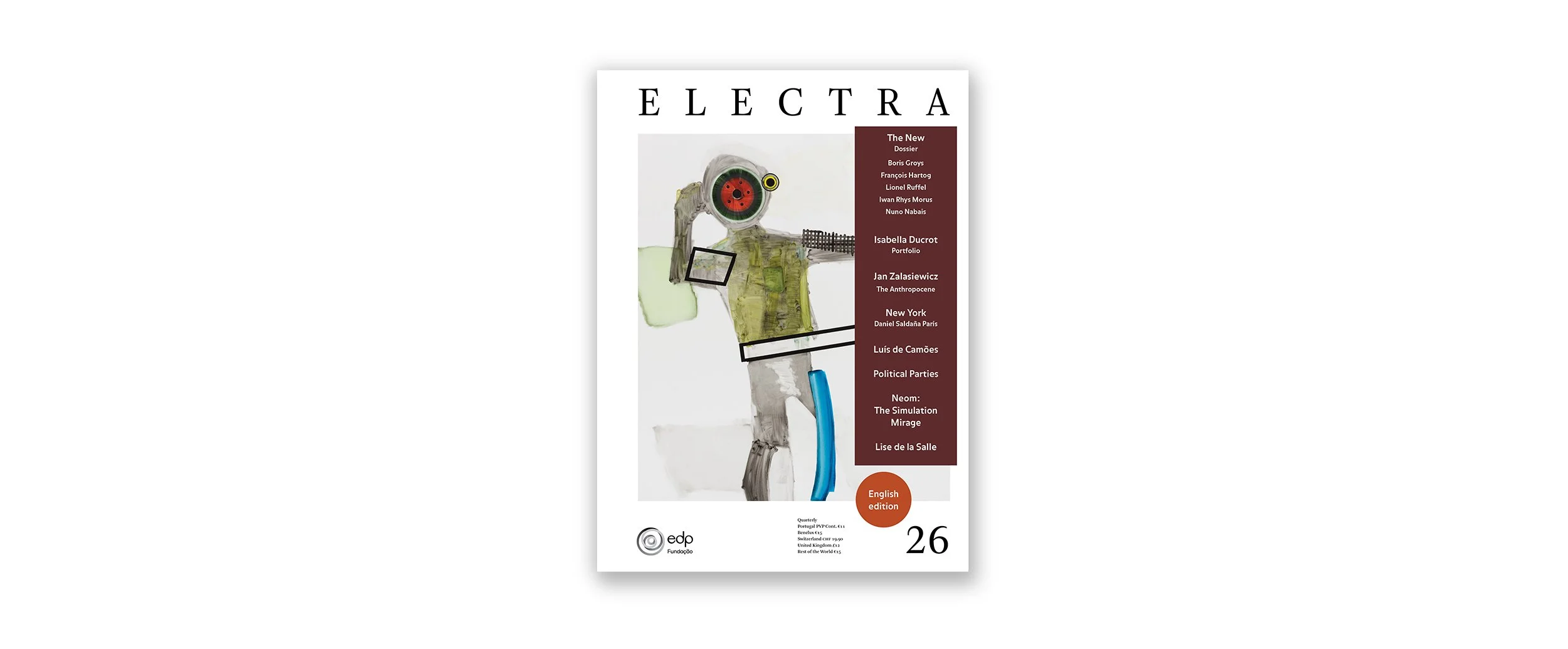....Electra 9 / Speed..Electra 9 / Velocidade....
















....Electra 9 / Speed..Electra 9 / Velocidade....
....
Issue 9 marks the second anniversary of Electra magazine. “Speed has changed and determined everything: politics and communication, the economy and society, science and cybernetics, art and love, food and sleep, sickness and health, life and death”, one may read in the magazine’s editorial. This dossier includes the collaboration of renowned authors whose works have been permeated by the theme of Speed as a topic that inspires analysis and reflection: François Hartog, Frédéric Neyrat, Yves Citton, Laurent de Sutter, Federico Leoni, Aurélien Barrau, António Guerreiro and João Pacheco.
The section “In the First Person” offers an interview with Vandana Shiva, one of the most well-known environmental activists of our time.
The German artist Stefan Kürten is the author of the Portfolio, with the title Pink Turns to Blue, accompanied by an essay by curator and critic Gregor Jansen, which speaks of the inspiration which Kürten’s work finds in cinema and the strange relationship between architecture, innocence and terror.
“Should ethical or political reasons be able to restrict literary and artistic works?” is the question that provides the theme to the section “Diagonal”. This question, raised by the controversy surrounding the fact that the Nobel Prize in Literature was awarded to Peter Handke, is answered by João Barrento, essayist and translator, and Michel Surya, writer and director of the French journal Lignes.
In this ninth edition of Electra, painter João Queiroz comments on the words written by painter Paul Gauguin; Gorbachev is the central character in an article by William Taubman, which draws a picture of a “tragic hero”; Brazilian essayist and novelist Silviano Santiago, a specialist in the work of Guimarães Rosa, writes about the Portuguese edition of Grande Sertão: Veredas (The Devil to Pay in the Backlands).
.
Softcover, 27 x 20 cm, 268 pages
—
..
Neste número 9, a revista Electra assinala os seus dois anos de vida. “A velocidade mudou e determinou tudo: a política e a comunicação, a economia e a sociedade, a ciência e a cibernética, a arte e o amor, a comida e o sono, a doença e a saúde, a vida e a morte.”, lê-se no editorial da revista. O dossier conta com a colaboração de reconhecidos autores, em cujas obras o tema da Velocidade tem sido objecto de análise e reflexão: François Hartog, Frédéric Neyrat, Yves Citton, Laurent de Sutter, Federico Leoni, Aurélien Barrau, António Guerreiro e João Pacheco.
Na secção “Primeira Pessoa” é entrevistada Vandana Shiva, uma das mais conhecidas activistas ambientais do nosso tempo.
O artista alemão Stefan Kürten é o autor do Portfolio intitulado Pink Turns to Blue, acompanhado de um ensaio do curador e crítico Gregor Jansen, que fala da inspiração que a obra de Kürten encontra no cinema e da estranha relação entre arquitectura, inocência e terror.
”Deve uma obra literária ou artística ver-se limitada por razões éticas e políticas?” é a interrogação que dá o mote à secção “Diagonal”. A esta pergunta, suscitada pela polémica em torno da atribuição do Prémio Nobel da Literatura a Peter Handke, respondem o ensaísta e tradutor João Barrento, e o escritor e director da revista francesa Lignes Michel Surya.
O pintor João Queiroz comenta as palavras do pintor Paul Gauguin; Gorbatchov é a figura de um artigo de William Taubman, que traça o retrato de um “herói trágico”; o ensaísta e romancista brasileiro Silviano Santiago, especialista da obra de Guimarães Rosa, escreve sobre a edição em Portugal de Grande Sertão: Veredas.
.
Capa mole, 27 x 20 cm, 268 páginas
—
....
“....Some people call me an activist and say it as a compliment and a lot of people call me na activist and say it as a dis-compliment. For me it’s neither, because it’s my activism that has given me the best knowledge. I know by engaging. (...) The idea of the division between experts who know and activists who don’t and just act or order people who don’t know is a very artificial division, it’s a colonizing division. ..Algumas pessoas chamam-me activista como um elogio e muitas outras chamam-me activista como insulto. Para mim, não é uma coisa nem outra, porque foi o meu activismo que me deu o melhor dos conhecimentos, através do envolvimento. (...) A ideia de separar os especialistas que sabem e os activistas que não sabem e apenas agem ou influenciam pessoas que não sabem é muito artificial, é uma divisão colonizadora. ....”
“.... “In the early 1970s, the future began to be perceived as closed or closing, while the present gained strength, becoming the only temporal category available, as it were, cannibalising the past and the future. What becomes of acceleration in this new configuration? Does it disappear? Not at all, it appears; on the contrary, it is more present than ever (…) .. No início da década de 70, o futuro começa a ser percebido como algo fechado ou em fechamento, ao passo que o presente se impõe, tornando-se, por assim dizer, a única categoria temporal disponível, canibalizando as categorias do passado e do futuro. O que acontece à aceleração nesta nova configuração? Desaparece? De modo algum. Parece tornar-se, pelo contrário, mais presente que nunca (…) ....”
-
....
Director / José Manuel dos Santos
Editor / António Guerreiro
Portfolio / Stefan Kürten
Published by Fundação EDP
Summer 2020.Softcover, 27 x 20 cm, 268 pages
ISBN 978 972 8909 970.. Director / José Manuel dos Santos
Editor / António Guerreiro
Portfólio / Stefan Kürten
Publicado por Fundação EDP
Verão 2020.Capa mole, 27 x 20 cm, 268 páginas
ISBN 978 972 8909 970....












XIII Ibero-American Biennial of Architecture and Urbanism Award!